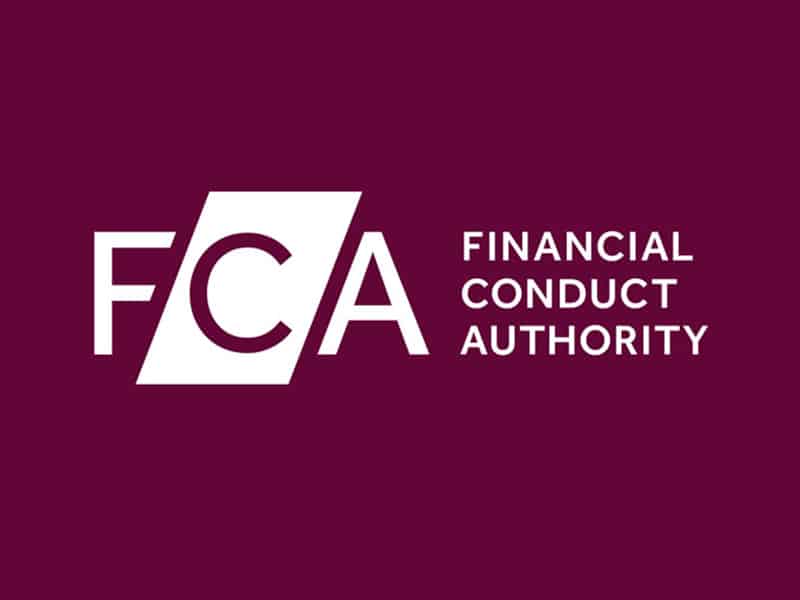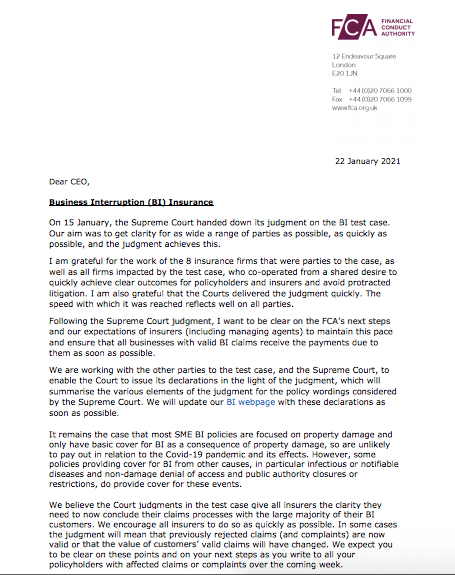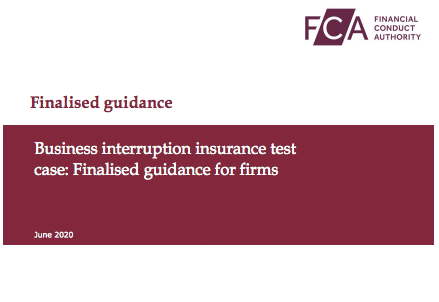On 15 January 2021, the Supreme Court handed down its ruling in the FCA test case on business interruption insurance against six insurers . Many businesses will now be considering the next steps whilst waiting for their insurers to assess their case. The FCA has issued a letter setting out the next steps encouraging insurers to reassess, progress and settle claims quickly in light of the ruling.
If you are a policyholder and your insurer is refusing to paying out for a business interruption claim, seek legal advice from our specialist BII claim solicitors immediately as you may have a litigation claim to seek financial redress.
FCA sets out next steps in business interruption cases positive for SMEs
The FCA has commented that whilst property damage may not be likely to result in pay outs, some policies providing cover for business interruption from other causes, in particular infectious or notifiable diseases and non-damage denial of access and public authority closures or restrictions, do provide cover for these events. The wording of each policy needs to be carefully considered and we can be instructed to assist and review the same.
Sheldon Mills, executive director at the FCA has published a letter on the FCA website.
It is essential that insurers reassess and settle claims quickly in the light of the
Supreme Court judgment, including making interim payments on policies where the claim has been accepted (either in full or in part) but elements of the calculation or agreement on the final settlement remain outstanding. This is consistent with the wider objectives of the FCA to support business and consumers during the current coronavirus situation.The Supreme Court judgment means that:
1. cover may be available for partial closure of premises (as well as full closure) and for mandatory closure orders that were not legally binding
2. valid claims should not be reduced because the loss would have resulted in any event from the pandemic
This will mean that more policyholders will have valid claims and some pay-outs will be higher. All insurers should promptly reassess all BI claims affected by the test case in the light of the Supreme Court’s judgment, including those previously rejected or not fully paid, in accordance with Chapter 7 of our Guidance.
Read Stephen Mills letter here:
Read the FCA’s guidance for firms on the business interruption test case here
Is my company entitled to Business Interruption insurance?
Following the Supreme Court ruling, policyholders can expect to hear from their insurers. Each policy will need to be considered against the judgment and specific advice can be provided by this firm once we have been instructed to review your policy documents and we can be instructed on a damages based agreement.
The FCA believes and the Supreme Court has held that insurers should be liable for paying out for business interruption claims related to the coronavirus pandemic and the subsequent government lockdown restrictions placed on UK businesses.
There are policies where it is clear that the insurer has an obligation to pay out on a policy. For these policies, it is incumbent on the insurer to assess and settle these claims quickly. Financial pressures on policyholders should not be exacerbated by slow payment, rather, such claims should be paid as soon as possible.
I have received my insurer’s response to my business interruption complaint
The FCA has encouraged insurers to reassess all potentially affected complaints in light of the ruling, including those that they did not fully uphold, unless the complaint has been properly settled on a full and final settlement basis.
If a complaint has been referred to the Financial Ombudsman Service (FOS), the insurer should keep the Ombudsman fully informed.
Have you received a business interruption full and final settlement offer from your insurer?
The FCA has stated that for affected claims where full and final settlements have been agreed, insurers should review the information provided to customers, to ensure that it was clear, fair and not misleading. Insurers should have informed policyholders about the test case and its implications when an offer to settle a potentially affected claim was made.
Insurers are being invited to contact affected customers and ensure that all valid claims are identified and that any necessary adjustments are made to any settlement offers (including full and final offers) that were made but not accepted by customers prior to 15 January 2021. Any residual payments should be made to customers accordingly.
If you require advice on your rights in respect of a business interruption claim with your insurers, or on a settlement offer, get in contact with our team for legal advice or a second opinion.
Has your insurer denied your business interruption insurance claim during COVID-19?
There are policies where it is clear that the insurer has an obligation to pay out on a policy (i.e. policies that are not solely related to property damage). The main grounds of refusal may include the following:
- unless a business was ordered to and did close completely there was no inability to use the premises within the meaning of the insurance wording, and unless it ceased to trade completely, its activities were not interrupted and so cover is not triggered.
- guidance issued by the government advising a nationwide lockdown was according to some insurers not defined as a “restriction” “imposed by” a public authority.
- Some insurers argue that their policy wordings do not provide cover in the case of pandemics.
- Business loss did not “result from” the necessary local disease occurrence or danger but instead were caused by the wide-area pandemic and so cover is not triggered.
- As to causation and quantum of any claim, insurers may state in their denial that most losses would have been suffered anyway, even but for the insured peril/business closure, for example because of the broader Covid-19 pandemic, self-isolation and social distancing.
Where there are further disputes that are the subject of legal proceedings… firms should seek to narrow the issues in dispute to ensure that the litigation can proceed in the cheapest and quickest way possible, reflecting the firm’s obligation to act fairly, honestly and professionally in the best interests of its customers.
Why use a solicitor instead of a broker to submit your BII Claim?
Our Business Interruption Insurance Claim Solicitors add value by optimising the value of the claim. There may be heads of claim which have been missed or not considered by a non-lawyer such as a broker. It is important to instruct specialist lawyers to present your claim in a way that makes it easy for the insurer to accept and less likely to refuse.
If the insurer refuses any part of the claim, a business will also need a lawyer to pursue litigation, which a broker cannot do. It is very important to consider litigation at the outset when seeking to negotiate a good settlement. Our litigation lawyers are experienced in settlement negotiations to get an optimum award for our clients.
Instruct our Business Interruption Litigation Lawyers on a DBA
We ensure that we provide the best possible outcome for our clients by conducting in depth investigation and research into the realistic prospects of a case before selecting the appropriate course of action in order to reduce time and expense. Liability for costs is always an issue in litigation and based on our extensive litigation experience we provide our clients with as much strategic, practical as well as carefully considered legal advice in order to ensure minimum risk in respect of costs. Where appropriate we encourage the use of alternative dispute resolution (such as mediation and without prejudice negotiation) and our lawyer’s negotiation skills are first class. If early settlement at advantageous terms is not possible, we are extremely experienced and capable at navigating our clients through the litigation process.
A damages-based agreement is a contingency fee agreement agreed by a solicitor and a client which provides that a client will make a payment to the representative if the client obtains “a specified financial benefit” (usually damages paid by the losing side or via a settlement sum extracted). The amount of the payment will be determined as a percentage of the compensation received by the client (which will be set out in the DBA and agreed with the client in advance). If the client is unsuccessful in their litigation case, the solicitor will not be paid for the work done under the DBA.
LIMITATION ACT 1980 – WARNING
The Limitation Act 1980 sets out strict statutory deadlines within which you must bring litigation claims. Your legal rights will become irreversibly time-barred if you fail to take legal action (or defend a claim on time). Therefore, you should seek specific legal advice about your legal dispute at the very first opportunity so that you understand the time you have left. Failure to take advice or delay in taking action can be fatal to your prospects of success.
Please note that for regulatory reasons we do not offer any free advice.


